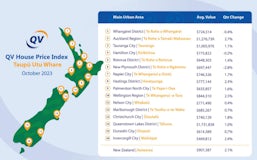Are mortgage processing times too slow? New tenancy laws and House prices outpace apartments.
Too long; didn't read? Here're this week's TLDRs...
Home values fell in 2024, stabilisation expected in 2025
Read the article
Housing market sees declining prices and low new listings
Read the article
Auckland and Wellington property values continue to decline
Read the article
Barfoot & Thompson's December sales strong; prices slightly down
Read the article
House prices outpace apartments due to land value appreciation
Read the article
Construction sector poised for growth in 2025
Read the article
Mortgage rates predicted to fall below 5% in 2025
Read the article
Commercial property market faces significant downturn in 2024
Read the article
New tenancy law balances landlord and tenant interests
Read the article
Kāinga Ora increases warnings and relocations for disruptive tenants
Read the article
Non-bank lenders see increased demand from struggling homeowners
Read the article
Call for increased bank staffing to improve mortgage processing times
Read the article
Challenger acquires Bluestone's NZ mortgage book for $597M
Read the article



